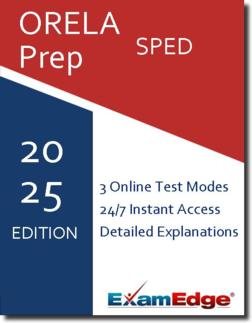ORELA Special Education (601) Practice Tests & Test Prep by Exam Edge - Test Reviews
Based on 17 Reviews
- Real Exam Simulation: Timed questions and matching content build comfort for your ORELA SPED test day.
- Instant, 24/7 Access: Web-based ORELA Special Education practice exams with no software needed.
- Clear Explanations: Step-by-step answers and explanations for your ORELA exam to strengthen understanding.
- Boosted Confidence: Reduces anxiety and improves test-taking skills to ace your ORELA Special Education (601).

ORELA Special Education (601) Practice Tests & Test Prep by Exam Edge - Review
ORELA Special Education - Reviews
Excellent
Based on
85
reviews
See why our users from 154 countries love us for their exam prep! Including 17 reviews for the ORELA SPED exam.
Exam Edge is an Industry Leader in Online Test Prep. We work with our Institutional Partners to offer a wide array of practice tests that will help you prepare for your big exam. No Matter how niche field of interest might be, were here to help you prepare for your test day.
| 2.8M | 4.5M | |
| Users | Tests Taken | |
| 100K | 19 | |
| Unique Exams | Years in Business | |


